IELTS SPEAKING
The IELTS Speaking test evaluates your ability to communicate effectively in English, focusing on fluency, vocabulary, grammar, and pronunciation. It is a face-to-face interview with a certified examiner that lasts for 11–14 minutes and is conducted into three parts.
Part 1: Introduction and Interview (4-5 minutes)
Part 2: Cue Card (3–4 minutes).
Part 3: Discussion (4-5 Minutes)
Below information includes an introduction of the test format, sample questions, and important advice to help you prepare for and perform well on exam day.
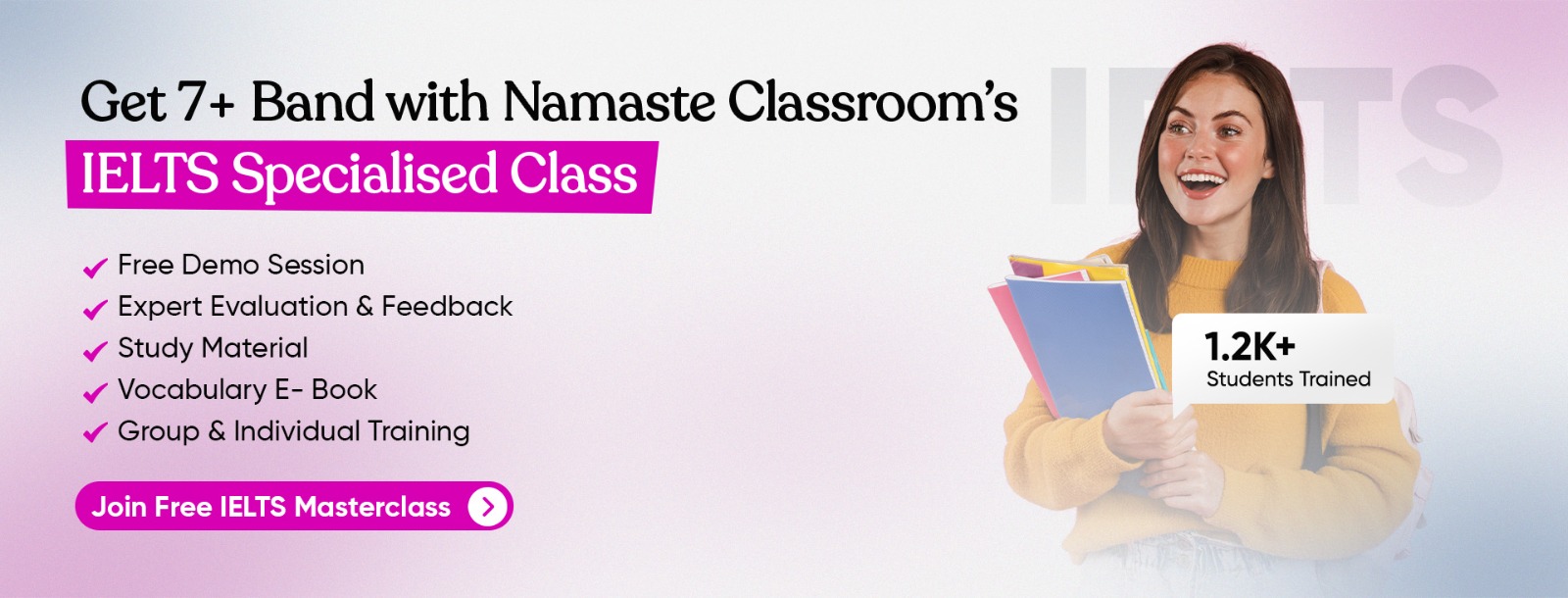
How is the Speaking test conducted?
Introduction and Interview
There examiner will verify your ID and ask questions on basic topics like school, family, friends, pet, favorite place
Long turn
You will be given a cue card or task card. After the 1 minute of preparation time, you'll be expected to speak for 2-3 minutes on the topic after which the examiner will ask questions based on the topic.
Discussion
You'll have to discuss with the examiner, the issues related to the topic given in Part 2 of the IELTS Speaking test.
IELTS Assessment Criteria:
| PARAMETERS | % | Descriptors |
|---|---|---|
| Fluency and Coherence | 25% |
|
| Lexical Resource | 25% |
|
| Grammatical Range and Accuracy | 25% | The correct application of grammar is crucial for the IELTS Speaking and Writing module.
|
| Pronunciation | 25% | The clarity and naturalness of your voice are used to evaluate your pronunciation. They will assess you on certain qualities, such as rhythm, intonation, and use of stress to contrast ideas. |
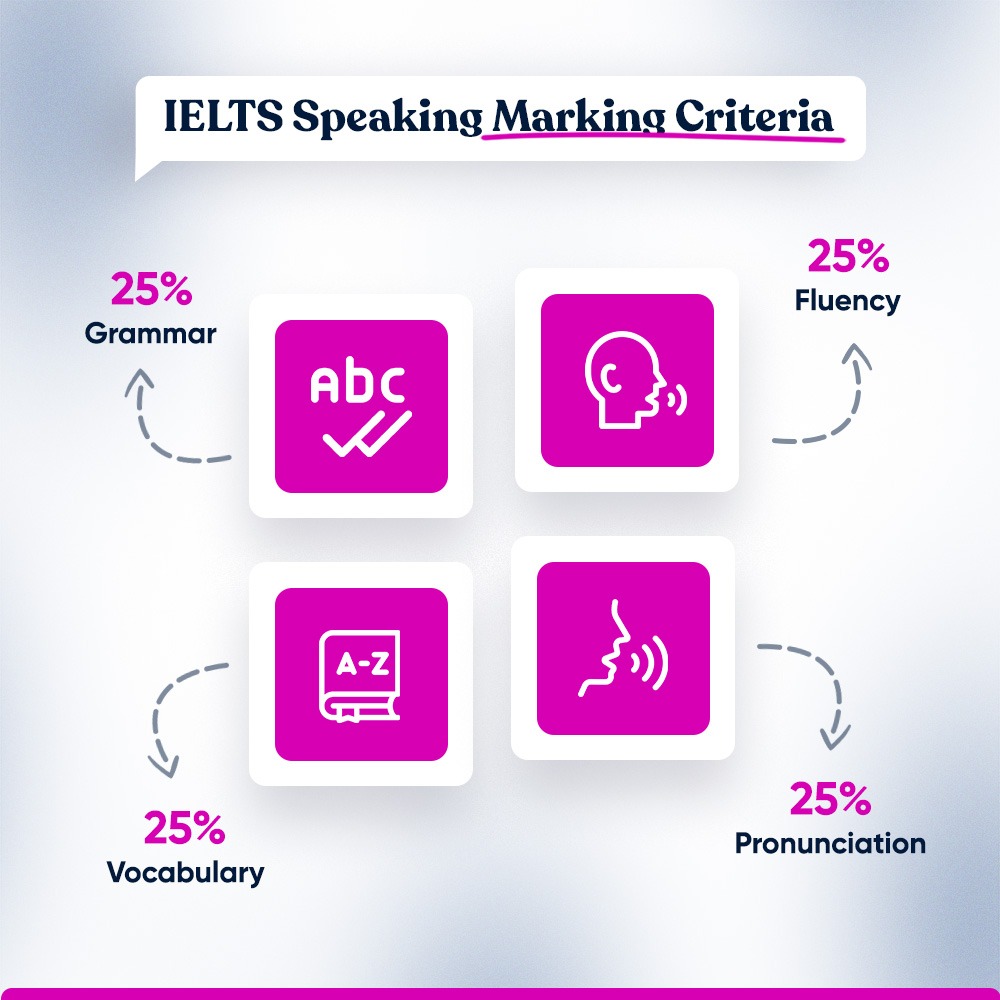
Understanding the IELTS Speaking Test:
The above descriptors will be used by your IELTS Speaking Examiner to evaluate your speaking abilities & will assign a band score to each one based on how well you performed overall throughout the four categories.
The lowest band score is 0, while the highest is 9 .
Tips: Practice speaking about common topics (e.g., advertisements, hobbies, places). Provide detailed answers, use varied vocabulary, and maintain clear pronunciation.
Part 1: Introduction and Interview (4–5 minutes)
The examiner introduces themselves and confirms your identity.
You’ll answer general questions about topics like family, work/studies, and interests in one to three lines. It will help the examiner evaluate your ability to communicate opinions and information on everyday subjects.
Sample Part 1 Questions:
Question: What's your full name?
"My name’s Tanya Jadhav , but you can just call me Tanya !"
(Tip: Keep your response polite, natural, and confident. Part 1 are simple introductory questions to make you comfortable into the conversation with the examiner.)
Question: Are you studying somewhere or working ?
"I'm currently pursuing my Bachelors in Chemistry . Besides my studies, I keep my mind engaged with distinguished projects and activities to gain hands-on experience."
Question: What do you think is the most fascinating part of your town or village?
The most happening location of my town has always been the festival grounds. There's always some celebration, whether it's a festival, a local fair, or a community event. The area comes alive with vibrant colors, traditional music, and delicious food stalls. It's a fantastic place to meet people, experience the local culture, subsequently the energy and excitement are truly contagious!
- Do you spend your free time outside?
- Do you have any animals in your home as a pet?
- What kind of jobs do the people in your hometown do?
- Will you buy something because of an Advertisement?
- How easy is it for you to read books in English ?
- Has your life changed much in the last year?
- Do you like any Foreign Celebrities ?
- When was the last time you received a gift ?
- Which type of programmes are most popular in your country?
- Why do you think some people prefer magazines to newspaper?
Part 2: Cue card / Task card (3 – 4 minutes)
The purpose of IELTS Speaking Part 2 is to assess your capacity to speak at length on a certain subject.
This little assistance will comprehend you in Part 2 of the IELTS Speaking exam:
Format: A task card with a topic and points to cover will be handed to you.
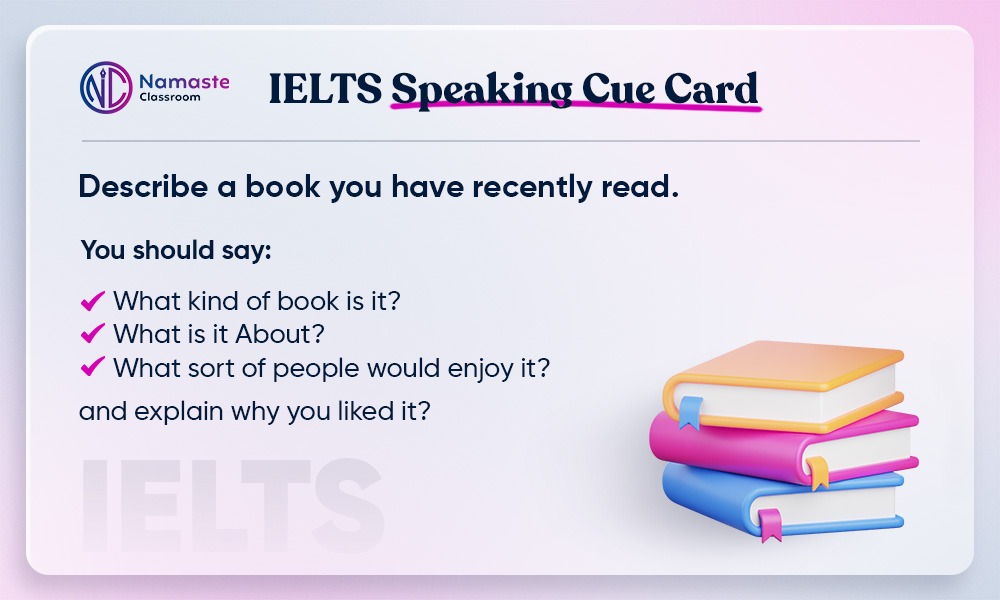
SAMPLE ANSWER:
- One of the books I recently read was James Clear’s “Atomic Habits.” It’s a self-help book with a practical focus on human growth, specifically how to form healthy habits and break harmful ones. It provides actionable ideas that can be implemented in everyday life to attain long-term success.
- The book’s central idea is that making little, persistent changes can result in significant benefits over time. It uses the analogy of “atomic” alterations, or minor adjustments, to demonstrate how they can compound and produce substantial outcomes. To illustrate, it explains how to use the “cue, craving, response, reward” paradigm to form new habits or break bad ones.
- This book is great for anyone who wants to enhance their time management, productivity, or even personal wellness. Students, professionals, and anyone looking to establish positive habits in their lives would find it quite useful. It’s also ideal for people who are overwhelmed by the prospect of change and prefer a step-by-step approach.
- Personally, I enjoyed the realistic examples and scientific approach. It employs psychology and behavioral science to explain how habits function, making the tactics appear reasonable and convincing. I especially loved the practical activities at the end of each chapter, which encouraged me to implement what I had learned.
- To summarise, Atomic Habits is a book that not only motivates you to take control of your life, but it also provides you with the skills. It’s a book I’d recommend to anyone trying to make significant progress in their life, one small step at a time.
TIPS ON SPEAKING FOR PART 2
- You will get a minute to prepare on the same and then speak for upto 2 minutes
- Prepare by making good use of the minute.
- Be sure you mention every aspect of the topic by concentrating on the task's prompts.
- To help you organise your thoughts, write down important ideas in the form of bullet points.
- Your performance in IELTS Speaking Part 2 will improvise if you understand the speaking test format and practice regularly.
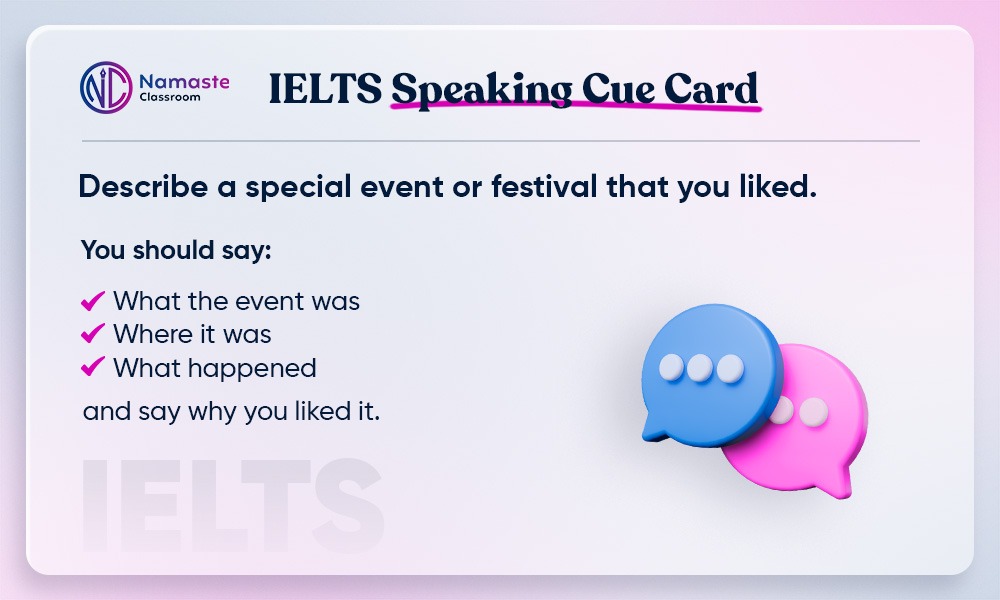
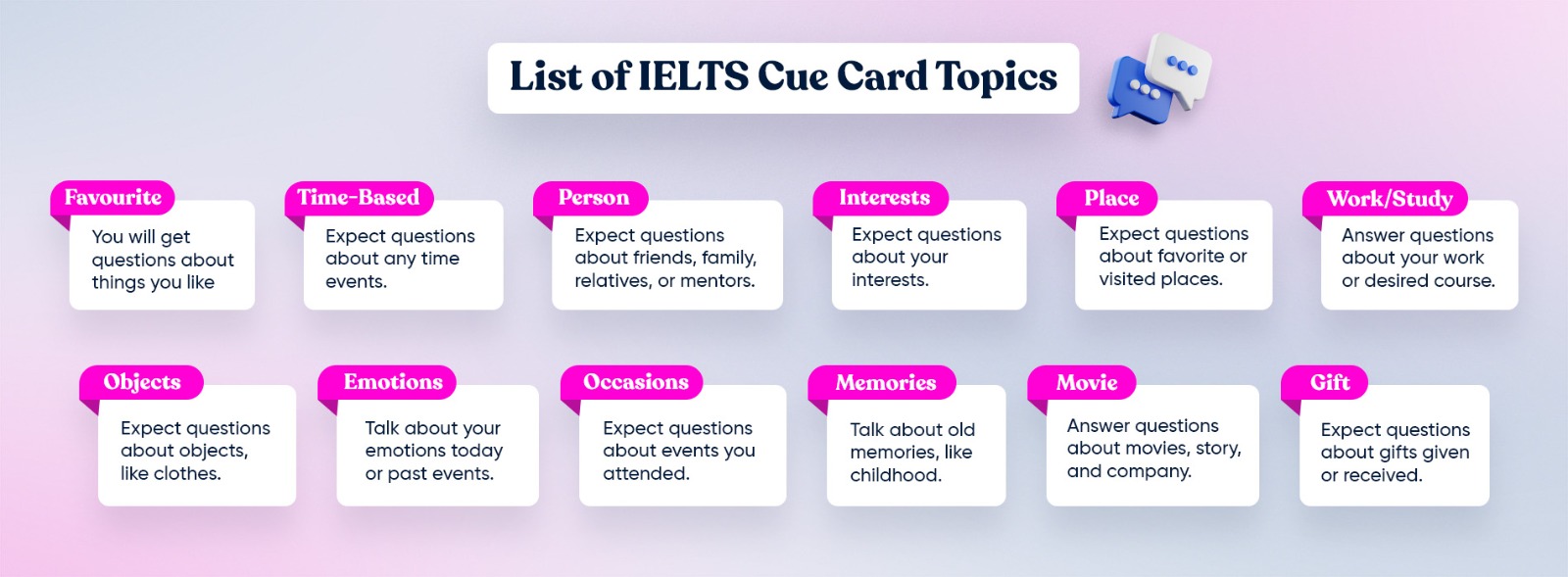
Part 3: Discussion (4 – 5 minutes)
The discussion or follow-up round in IELTS Speaking Part 3 expands on the subject covered in Part 2. The examiner poses more general, abstract questions concerning the subject you just discussed in this phase.
These questions require deeper thinking, detailed explanations, and the ability to discuss ideas in a structured way.
Expression of thoughts, providing evidence for your responses, and analyzing other viewpoints while demonstrating sophisticated language skills are all important in Part 3.
What to Expect in IELTS Speaking Part 3?
- Four to six questions will be asked by the examiner, which will begin with a basic question before progressively progressing to more complex or analytical ones.
- The questions go beyond personal experiences and include National or global environments.
- Particular thinking requires extensive responses, including reasons, examples, and counterevidences as required.
| TOPIC | QUESTION & SAMPLE ANSWER |
|---|---|
| BOOKS | Do people read more nowadays? Yes, nowadays people are keen on reading, thanks to the increment of digital gadgets and e-books, which make literature more accessible. However, the nature of reading has changed, with more individuals engaging themselves into reading online articles, blogs, and social media content instead of customary printed books. |
| Do you read before going to bed? Certainly, I normally read before bed to relax and decompress. Reading a few chapters of a Novel helps me disengage from the stresses of the day and prepare for a good night’s sleep. | |
| In your opinion, how will e-books affect paper books? E-books are expected to gain popularity due to their convenience and portability, but to my notion traditional books will always hold a particular position. The actual sensation of holding a book and flipping through its pages is distinct, and digital versions cannot match it. | |
| ADVERTISEMENTS | What are popular types of advertising in today’s world? |
| What type of media advertising do you like most? | |
| Do you think advertising influences what people buy? | |
| What factors should be taken into account when making advertisements? | |
| BUSINESS | In your opinion, do business people have to work long hours? |
| How do business people relax? | |
| Let’s move on to the topic of small businesses. How can a small business grow big? | |
| ENVIRONMENT | What are some of the main environmental problems in your county? |
| Why should people be concerned about the environment? | |
| How can people protect the environment? | |
| Do you think money should be spent on protecting animals? |
IELTS SPEAKING TIPS
Part 1: Overview
- Practice on a daily basis to improve confidence and fluency.
- Be prepared for frequently asked questions and topics.
- Keep friendly and engaging to create a comfortable atmosphere.
- Avoid short answers—expand your responses.
- Pay attention to natural rhythm and clear pronunciation.
Part 2: Long Turn
- Understand the topic and task.
- Plan your response during the 1-minute preparation.
- Speak for the full 2 minutes confidently until examiner intervenes you.
- Use diverse vocabulary and correct grammar.
- Share specific examples or personal stories.
Part 3: Discussion
- Listen carefully and understand the question.
- Support your answers with examples and reasons.
- Organise your thoughts and use linking words ( See image )
- Speak clearly, confidently, and with detail.
- Avoid unsure answers—be specific and logical.
Linking Words in English

Emphasis
Indeed Undoubtedly Obviously Particularly / In particular Absolutely Importantly Clearly Especially Definitely Never Without a doubt It should be noted

Addition
Furthermore Additionally / An additional Too Also Along with As well as that In addition Besides Not only but also Moreover Apart from this In addition to this

Contrast
Nevertheless Unlike Nonetheless On the other hand Despite / In spite of In contrast (to) Whereas While Alternatively Conversely Differing from Even so
Benefits of Attending Namaste Classroom IELTS Writing Live Classes:
- Personalized Guidance from Expert Faculty
- Real-Time Practice with Authentic Materials:
- Proven Tips and Strategies
- Grammar and Vocabulary Enhancement
- Band-Specific Feedback
- Assistance with Booking the Test
Join Namaste Classroom’s IELTS Speaking Live classes to boost your performance and reach your desired band score!
